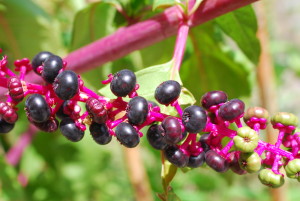Phytolacca decandra is a herbaceous perennial plant in the pokeweed family Phytolaccaceae growing up to 8 feet (2 meters) in height. It is native to the eastern United States and has significant toxicity.
Contents
Uses
- Phytolacca decandra is promoted in alternative medicine as a dietary supplement that can treat a wide range of maladies including mumps, arthritis and various skin conditions. While phytolacca decandra has been subject to laboratory research, there is no medical evidence that it has any beneficial effect on human health.
Benefits
-
The dark purple berries were once popular for making ink. In fact, the names inkberry and inkweed were used in reference to this. The berries were also commonly used as food coloring. The entire plant is considered poisonous before cooking, and many experts recommend not consuming cooked pokeweed, as the toxins may remain. Even though this is true,the young shoots are sometimes boiled and eaten like greens or used in poke salad. More common, however, was its use for medicinal purposes.
Phytolacca decandra was often converted into various forms to treat an array of symptoms. These preparations included everything from extract teas and tonics to tinctures, poultices, and powders. For example, the cooked berries or tea extract were commonly ingested as a remedy for rheumatism. The leaves and root of Phytolacca decandra were often mashed into a poultice and applied externally to relieve sprains, bruising, and joint inflammation.
As far back as the late 1800s, the powder made from this plant has been employed by homeopathic practitioners as a choice remedy for treating cancer and lymphatic conditions, such as with breast infections. It worked well with lumps and growths too. Glandular conditions associated with swollen tonsils or sore throats, were also treated with remedies of Phytolacca decandra. It is thought that the plant helps relieve pain and inflammation, and promotes healing. Phytolacca decandra seems to work well on fibrous tissues and muscles.
Additional remedies of the plant include various skin-related issues such as eczema and psoriasis. Many Native Americans also prescribed Phytolacca decandra to stimulate the heart. In some areas, the plant was thought to drive away evil spirits. Thus, it would be given to those who were deemed to be possessed, triggering these patients to vomit and ultimately cleanse their bodies.
Cautions
- None recorded.
Interactions
- When taking any homeopathic remedy, do not use peppermint products, coffee, or alcohol. These products may cause the remedy to be ineffective.
Other names
Phytolacca decandra (also Phytolacca americana) is known by many names — American pokeweed, pokeberry, poke root, inkberry, poke, cancer root, inkweed, and pigeonberry.
References
Source: WiseGeek, http://www.wisegeek.com/what-is-phytolacca-decandra.htm
Wikipedia, https://en.wikipedia.org/wiki/Phytolacca_americana#Uses

